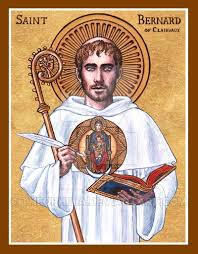HOMILY WEEK 20 04 – Year II
Wearing the Wedding Garment:
Memorial of St. Bernard
(Ezk 36:23-28; Ps 51; Mt 22:1-14)
*************************************************************
Have you ever felt out of place because you were not dressed right for a particular occasion?
Today’s readings invite us to put on the garments of profound repentance, deep faith and genuine love.
In the gospel, Jesus uses a parable, a literary tool that seeks to loosen our “stuckness” to one worldview and open us up to a bigger world view. This parable is aimed at the corrupt religious leaders of his day who have failed utterly in being the holy people of God that God wanted and who, worse, actually thought they were.
The first reading from the prophet Ezekiel and the psalm both carry the same message – God will forgive them, heal them and renew them if only they admit their failure, repent and allow that to happen. That is a clear call to us to come to Jesus for forgiveness of our sins, healing of our shortcomings, and then to pass on the love we have received through selfless service.
The wedding garment of the gospel stands for that radically new way of life making up the kingdom of God – a response of humble repentance to God’s unconditional love, genuine faith in Jesus as the Messiah, and a life of fidelity to God’s will manifested through heartfelt compassion and love.
Ephesians 6:14 is a good description of that kingdom reality: Fasten the belt of truth around your waist, put on the breastplate of righteousness, and as shoes for your feet put on whatever will make you ready to proclaim the gospel of peace. With all of these take the shield of faith. Take the helmet of salvation, and the sword of the Spirit, which is the Word of God. Colossians 3:12 adds these qualities: Clothe yourself in “heartfelt compassion, kindness, humility, gentleness and patience.”
Rick Warren, pastor of Saddleback Church in California, shared the example of a bishop visiting a leper colony. The chain on the bishop’s pectoral cross broke as he leaned over to talk to a leper, and the cross fell into the man’s puss-filled wound. The bishop, filled with Christ-like inspiration and love, reached down into the wound and picked up the cross. That is our task as Christians, he pointed out, to reach down, put our hands into the leprous wounds of our world, and pick up the cross.
The fellow in the parable thrown out into the wilderness represents those religious leaders of Jesus’ day whose hypocrisy gave them the appearance of holiness, but they were missing the essentials of all those qualities described above. He also represents those of us today who act nice to others on the outside, but are full of anger and bitterness from family of origin wounds about which we are in denial, have never faced or healed, and take out on those close to us whom we are supposed to love.
 We are given a model to follow today of trusting completely in God’s love – St. Bernard of Clairvaux. He was born near Dijon, France, in 1090 of a noble family. In his Apologia, he wrote it was because of his unruly nature that he chose the newly founded Cistercians, thinking their austerity could tame him. At age 22 he joined the new monastery at Cîteaux, founded 14 years earlier to reject laxity and riches of the Benedictine Order such as Cluny, and to return to a primitive poverty and austerity of life.
We are given a model to follow today of trusting completely in God’s love – St. Bernard of Clairvaux. He was born near Dijon, France, in 1090 of a noble family. In his Apologia, he wrote it was because of his unruly nature that he chose the newly founded Cistercians, thinking their austerity could tame him. At age 22 he joined the new monastery at Cîteaux, founded 14 years earlier to reject laxity and riches of the Benedictine Order such as Cluny, and to return to a primitive poverty and austerity of life.
His remarkable enthusiasm helped persuade his uncle, four of his brothers and two-dozen friends to join him. Within three years he was sent out with 12 monks to a diocese in Champagne where, in a valley that came to be known as the Valley of Light (‘Clairvaux’) Bernard founded the monastery where he served as abbot for the rest of his life.
Bernard was a man of great holiness and wisdom, and although often in poor health because of his austerities, he was active in many of the great public debates of the time. From the time he became abbot until his death in 1153, Bernard dominated the religious and political life of Western Europe. He strongly opposed the luxurious lives of some of the clergy, and fought against the persecution of the Jews. He was a prolific writer, of an inspiring rather than a technical kind, and his writings have had a lasting influence on Catholic spirituality. His efforts even had an effect on Cluny, inspiring reform efforts there. His abbey became the mother house of dozens of Cistercian monasteries around the world. By the time of his death, the Cistercian Order had grown from one house to 343, of which 68 were daughter houses of Clairvaux itself. When Bernard died, Europe mourned. He was canonized in 1174 and declared a Doctor of the Church in 1830.
The Eucharist is both an experience of the unconditional love of God made present through the life, death and resurrection of Jesus, and a mandate to live out the Eucharist by sharing that love with the world through selfless compassion and service.
May our celebration today empower us to clothe ourselves with the garments of profound repentance, deep faith and genuine love, as did St. Bernard.



